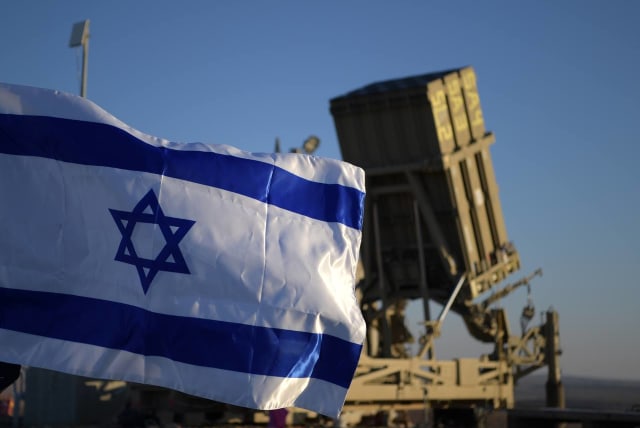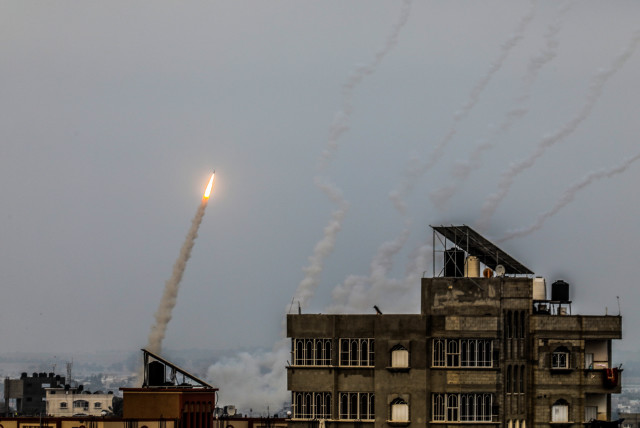Iron Dome, Israel's best defense, works overtime to protect population

The Media Line sat down with Maj. (res.) Libby Weiss, spokesperson for the IDF to delve into the role and effectiveness of the Iron Dome and the challenges the IDF faces.
On October 7, a devastating border invasion took place involving over 3,000 terrorists, half from Hamas and half from various other groups, affecting more than 25 communities along the Israel-Gaza border. Coupled with this, Israel has been bombarded with more than 6,700 rockets, leading to loss of life, injuries, and significant property damage. At the heart of Israel's defense is the Iron Dome, a joint Israel-US technological marvel that has successfully intercepted 97% of incoming rockets.
The Media Line's Felice Friedson sits down with Maj. (res.) Libby Weiss, spokesperson for the Israel Defense Forces (IDF), to delve into the role and effectiveness of the Iron Dome, the complex challenges faced by the IDF—including a significant hostage crisis—and the intricate considerations behind a potential ground invasion.
TML: It’s been 11 days since the Gaza border massacre. Tens of thousands of Israeli troops were being poised to begin an attack which is apparently being held up because of the weather. Could you tell me if the army is waiting for diplomatic maneuvers to play out initiating the operation?
Maj. Weiss: All that I can say is that any decision about a ground invasion is something the government will have to make, and of course, the IDF will be prepared for whatever decision the government makes on this issue.
TML: Isn’t this long delay going to be sort of a disadvantage for Israelis, tiring out soldiers and allowing time for the terrorists to dig in and improve its game plan?
Maj. Weiss: Well, again, we’ll be prepared for whatever decision is made and we’re confident that we’ll be able to strike a very serious blow to Hamas and make sure that they don’t have any of the capabilities to strike us again as they did on October 7.
TML: Do you believe that the hostage situation is sort of overwhelming everything in terms of the army calculations at the moment?
Maj. Weiss: Of course, our hearts are with the hostages and their families, and it’s important to say [that] the fastest way for them to come home would be for Hamas to release them immediately, even today without any terms and conditions. But of course, we are balancing their well-being and our concern about them coming home safely with a very, very important mission that we have.
TML: Is it possible, or conceivable, that Israel will try to negotiate its stand-down and forego the fate promised by the prime minister?
Maj. Weiss: That would be something that on the diplomatic level would have to be decided, and the prime minister’s office would be the right address for that.
TML: When details of the carnage became known, it was expected that civilized people would unconditionally reject Hamas and barbarism. Are you surprised by the pro-Hamas demonstrations that we’re seeing around the world?
- NO AUDIBLE ANSWER HERE -
TML: A battery of Iron Domes are situated throughout Israel for their missiles to work against rockets. Can you talk [about] how aggressive this battery of rockets has been, meaning [are they] working daily, as well as how many have they intercepted at the moment?

Maj. Weiss: Well, the Iron Dome has been absolutely critical in keeping Israelis safe from the more than 6,500 rockets that Hamas has launched since October 7. Now, the number of rockets that we’re seeing in a short amount of time is a big strategic jump from what they had, even in 2014.
We were there [then] for a 50-day operation. We saw Hamas launch a little over 5,000 rockets, so we’re just seeing a big leap in terms of the number of rockets, their range, and their degree of sophistication.
TML: Do you feel there’s an overload on the Iron Domes at the moment, that they can handle a massive amount of rockets that have been pouring in?
Maj. Weiss: Well, the Iron Dome batteries and of course, the incredible soldiers and officers who are manning them are fully capable of dealing with the situation, and of course, we have seen the degree to which they have kept Israelis safe just from the non-stop rocket fire over the last 10 days.
TML: The United States has been upfront in saying that they are going to be adding to the arsenal. Can you talk about that?
Maj. Weiss: Well, of course, the US and Israel, there’s open lines of communication on all levels, and of course, it’s a significant ally, perhaps our largest ally. I have no doubt that there are open discussions that are taking place at all levels.
TML: There have been rockets that have hit homes. There have been some people killed. There have been some people wounded. Do you have numbers on this?
Maj. Weiss: I actually don’t for rockets, specifically, but what I can say about this, of course, is that we encourage everyone in Israel to follow the guidelines of the Homefront Command. Of course, when a siren is heard, for people to seek cover in shelters, and to understand that these are deadly rockets. The goal of these rockets that are being launched by Hamas are, of course, to strike civilians. That is the goal. And, of course, running to the shelters and following the instructions the Homefront Command is providing is the best way to stay safe in one of these barrages.
TML: There have been incidents where the sirens did not go off. What are people supposed to do in those situations?
Maj. Weiss: Well, in those situations the Homefront Command actually has an app that can be downloaded on your phone which will give you real-time updates about the situation where you are specifically, and it can provide guidelines in the event that a siren isn’t sounded.
TML: The price tag on those Iron Domes. What is it?
Maj. Weiss: I don’t know if I can give you that. Of course, we know that it is an expensive system, but one that protects Israelis. There is no question here that the reality on the ground would be a very, very different one without the Iron Dome.
TML: Do you feel that the Israel Defense Forces are ready for a multi-border war?
Maj. Weiss: We are a strong military, and we are well aware of the actors operating around us, and I’m competent that we will accomplish our goals and be able to deal with whatever we see develop.
TML: Hundreds of thousands of reservists have been called up. How long can that be sustained before there are many other parts that are going to start, I’d say, to turn the other direction, whether it be the economy [and the like]? People that are in tech who are creating defense systems are not there, and many people have been laid off already.
Maj. Weiss: Well, I can speak to the military, and we’ve had more than 300,000 reservists who have been called up. And I think that if you ask any Israeli there is a real sense that we are united behind this mission. We have people who are coming [here] from all over the world; Israelis who are coming back to serve in the reserves.
And right now, the focus is really on achieving that military goal, which is to make sure that Hamas will never do this again. And [that they] will never have the capacity to do something like what we saw on October 7. So, right now we are ready, and I believe that people from across the country understand why the service is so important right now.
TML: Do you anticipate this [war] dragging out for several weeks?
Maj. Weiss: I don’t want to put an exact timeline. We do believe that this is something that will take time, and that’s what we are preparing for.
TML: How many rockets have fallen into Gaza?
Maj. Weiss: Well, we know that hundreds of rockets have fallen into the Gaza Strip. The thing is just another example of the disregard that Hamas has for the well-being of their own people, and the price that they’re willing to pay within the Gaza Strip in order to strike Israeli communities across the country.
Jerusalem Post Store
`; document.getElementById("linkPremium").innerHTML = cont; var divWithLink = document.getElementById("premium-link"); if (divWithLink !== null && divWithLink !== 'undefined') { divWithLink.style.border = "solid 1px #cb0f3e"; divWithLink.style.textAlign = "center"; divWithLink.style.marginBottom = "15px"; divWithLink.style.marginTop = "15px"; divWithLink.style.width = "100%"; divWithLink.style.backgroundColor = "#122952"; divWithLink.style.color = "#ffffff"; divWithLink.style.lineHeight = "1.5"; } } (function (v, i) { });
